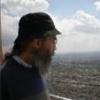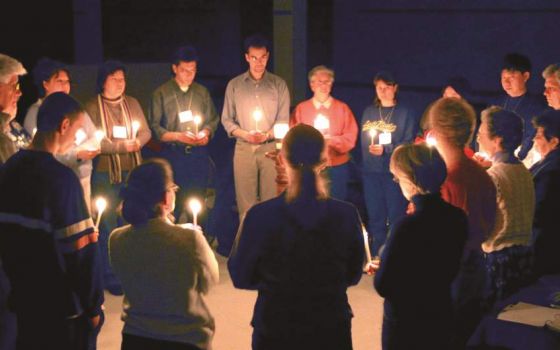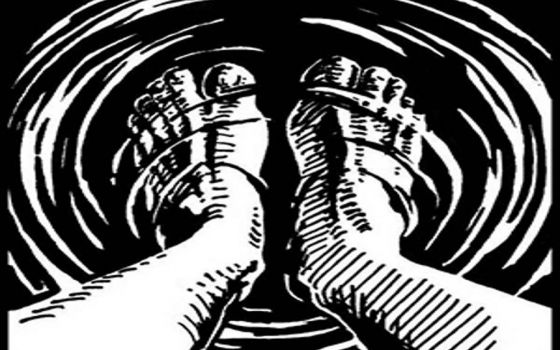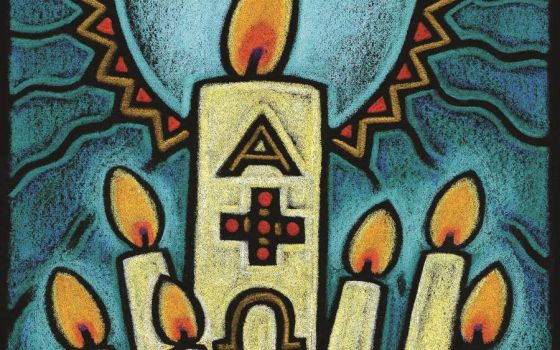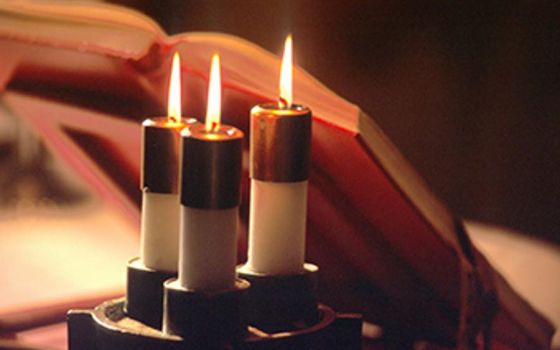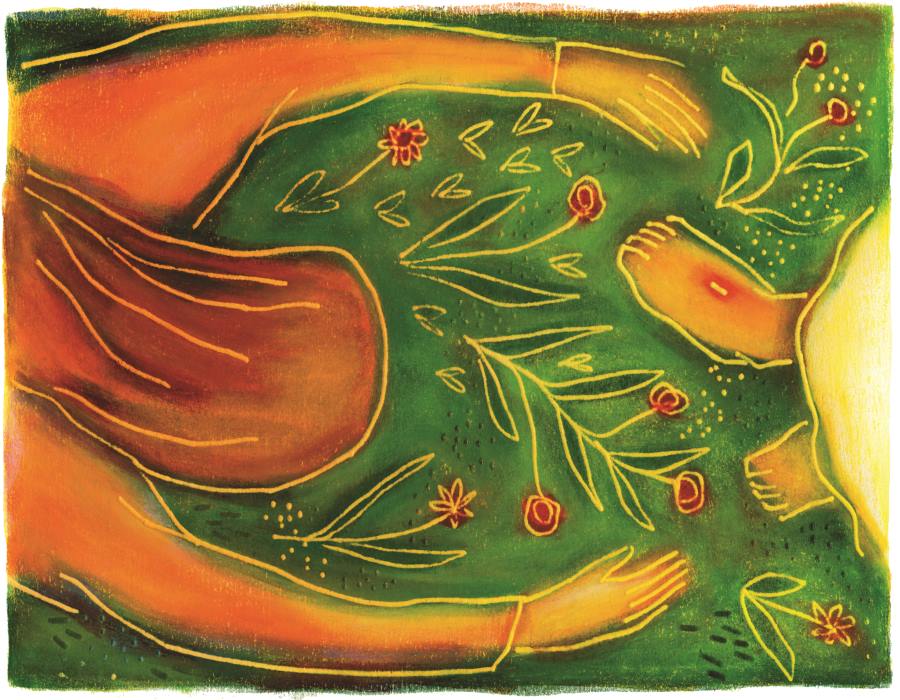
(Julie Lonneman)
In the February 2012 Celebration, I wrote about the sharing of the cup. It was a way to think about what's involved in moving back from Vatican II and #14 of "The Constitution on the Sacred Liturgy," to name what essentials of our Catholic ritual are here being sacrificed. By what right does anyone do this, does anyone at all set aside the council's vision of liturgy? I suggested that this is about thirst (and hunger), and that one way to think of what is happening was well said years ago by Alexander Schmemann (1921-1983) in his wonderfully named book For the Life of the World. Please read here the Schmemann text that concluded that column:
The "original" sin is not primarily that humanity "disobeyed" God; the sin is that we ceased to be hungry for God and for God alone, ceased to see our whole life depending on the whole world as a sacrament of communion with God. The sin was not that we neglected religious duties. The sin was that we thought of God in terms of religion, i.e., opposing God to life. The only real fall is our noneucharistic life in a noneucharistic world. The fall is not that we preferred world to God, distorted the balance between the spiritual and material, but that we made the world material, whereas we were to have transformed it into the "life in God" filled with meaning and spirit.
These words of Schmemann, a Russian who lived and taught in the United States, take me to well-known words of another Russian, one born exactly a century before Schmemann. We visit these two because you, the reader, are at the entrance to Lent 2012, entering through Mark's brief and lovely telling:
And the Spirit immediately drove him out into the wilderness. He was in the wilderness forty days, tempted by Satan; and he was with the wild beasts; and the angels waited on him. (Mark 1:12-13)
Not a single wasted word there! That other Russian, Fyodor Dostoevsky, didn't waste words either when he talked about those forty days and their temptations, but he needed many words in The Brothers Karamazov to let Ivan tell his brother Alyosha his story/poem that Ivan titled "The Grand Inquisitor." Ivan calls his effort "a ridiculous thing," but how many of us who read it for the first time years ago still feel it yet in our lives? Ivan's story became for us a parable-like event that visits us again and again on Lent's first Sunday and perhaps more often. So here we will set Mark on one side of a triptych: that unpredictable Spirit, the free but frightening wilderness and its wild beasts and angels and its Satan still not shaped by textbooks. On the other side of our triptych is Ivan and his story of the Inquisitor. The central image of this triptych is simply Lent 2012 in our church and for our world.
The aged Inquisitor in Ivan's story confronts his prisoner in a dark cell. The old man had known ("believed" might be better) at once who this stranger was when he saw him surrounded by a crowd in the plaza before the church. The stranger worked miracles. The Inquisitor watched from afar when a young girl whom the crowd had brought before the stranger sat up in her coffin. He knew what to do: Arrest him! But now the Inquisitor, who has had a long life of pondering Gospel and church and human nature, cannot simply move to condemning the stranger and burning him along with other accused heretics the next day. The Inquisitor must ask a question he knows will not be answered, must enter a dialogue knowing his will be the only voice. He is ascetic, nearly 90, a believer. All the logic and selflessness of his life's work must once be spoken to this prisoner of his, the one who — knowingly? ignorantly? — gave in the desert what human beings could not bear, the burden of freedom.
Keeping in mind our noneucharistic times, our year 2012 in the church and in the world, listen to how the Inquisitor unfolds the wilderness temptations. (The translation is that of David McDuff.) The Inquisitor speaks to the prisoner:
Remember the first question, though not in literal terms, its sense was this: "You want to go into the world and are going there with empty hands, with a kind of promise of freedom which they in their simplicity and inborn turpitude are unable even to comprehend, which they go in fear and awe of — for nothing has ever been more unendurable to man and human society than freedom? Look, you see those stones in that naked, burning hot wilderness? Turn them into loaves and mankind will go trotting after you like a flock, grateful and obedient, though ever fearful that you may take away your hand and that your loaves may cease to come their way." …
[I]n place of a firm foundation for the easing of the human conscience once and for all — you took everything that was exceptional, enigmatic and indeterminate, took everything that was beyond people's capacity to bear, and therefore acted as though you did not love them at all — and who was this? The one who had come to sacrifice his life for them! ...
You did not come down from the cross when they shouted to you, mocking and teasing you: "Come down from the cross and we will believe that it is you." You did not come down because again you did not want to enslave man with a miracle and because you thirsted for a faith that was free, not miraculous. You thirsted for a love that was free. … Upon my word, man is created weaker and more base than you supposed! Can he, can he perform the deeds of which you are capable? In respecting him so much you acted as though you had ceased to have compassion for him, because you demanded too much of him — and yet who was this? The very one you had loved more than yourself! Had you respected him less you would have demanded of him less, and that would have been closer to love.
Advertisement
And the rest: "We corrected your great deed and founded it upon miracle, mystery and authority. And people were glad that they had once been brought together into a flock and that at last from their hearts had been removed such a terrible gift, which had brought them so much torment."
We begin each Lent with this Gospel story of the temptation in the desert, but it seems that few usually confront the raw meaning Ivan found in the wilderness story that stands as the preamble to Jesus' ministry and its predictable consequences. But will we be able to tiptoe by the story — even the bare-bones version of dear Mark — in the year 2012? Could we somehow manage to see this Lent, with its font-side renunciations and affirmations ahead at Easter, as the way we ourselves — like Jesus in conversation with Satan — are brought to think thoughts and speak words we may not have known we had within us? But that requires what Lent wants to provide for us in its slow walk toward the font. It offers us a bit of fasting from the normal way we fill our hours. Far from making baptism a memory for us and a joyful goal for a few newcomers, Lent is for baptized people who are trying to recover what it meant to be embraced/drowned by the baptism waters.
If the wilderness story does present a Jesus saying no to miracle, mystery and authority, as Ivan's Inquisitor argues, then what? We can ponder that question through this Lent by doing what we are normally much too busy to do: open our eyes to what's going on. Simply see. But know what we are in for if we see. See, judge, act: This meditation of the Young Christian Workers Movement, far from a quaint mid-20th-century mantra, may be the baptismal imperative in our times. But the scale? That's the fearsome thing about our 21st-century challenge. So vast! If we will to see, we see so much, and all of it complex. Who wants to seek out the ways harm is being done in all the confusing guises and disguises of institutional church, of government at all its levels, of corporate and economic powers (health care, education, the business of playing with money, on and on)? Avoid it! Leave it to somebody else! Identify some sweeter, humbler way to be a baptized adult praying, fasting and giving alms.
When we come down to it, so much is against taking to heart the challenge of Schmemann's words: noneucharistic lives in a noneucharistic world. We would just rather not see our task as transforming any part of the world into the "life of God." Just get me through the day! But. But getting through the day is part and parcel of the whole thing, especially for dues-paying residents and citizens of the United States. We have our personal debts, our jobs, our properties, our children, our charities, our illnesses. We mean well! But what room do we make for that freedom Jesus chose in the wilderness? What room for the work of judging as free children of God how things are going out there among God's other children?
My own conviction has been — and, perhaps foolishly, still is — that eucharistic life is found and nourished in common in the Eucharist we make together. I have talked, probably too much, about liturgy as rehearsal. Liturgy is, under that image, not an end of something in itself, but is learning by heart to do in the world the deeds there rehearsed. But if we rehearse passivity, rehearse clericalism, rehearse being a world apart from that 2012 world with its vast and seemingly essential division of those who have and those who have not, then that's the part we'll play in "real life." But that's not the liturgy we've now and again glimpsed, especially after the clear summons of Vatican II. That summons, present in so many works of the council, rejected the Inquisitor's burden of correcting the bad choices Jesus made in the wilderness. We come to become. The Sunday-by-Sunday deeds of an assembly doing its liturgy — where Gospel and world are not kept apart but dwell together, for that is what our assembly is — will rehearse our eucharistic lives in the world, which we can finally say we love.
Lent, as much as any Sunday Mass or any sign of the cross, is itself a ritual, much neglected perhaps. It is concerned with our ongoing initiation as well the initiation of those who have newly come. Its fasting is the rehearsal of the hunger we've forgotten, of what Schmemann says about the original sin: that we ceased to be hungry for God and chose to live a noneucharistic life in a noneucharistic world. Ivan's poem "The Grand Inquisitor" can be read in this light, a commentary on the way we grasp for religion as comfort, consolation, certainty, camaraderie. But Lent comes to make us grapple with the meaning of what Jesus did and didn't do in the wilderness.
Editor's note: This reflection was originally published in the March 2012 issue of Celebration. Sign up to receive daily Lenten reflections.
